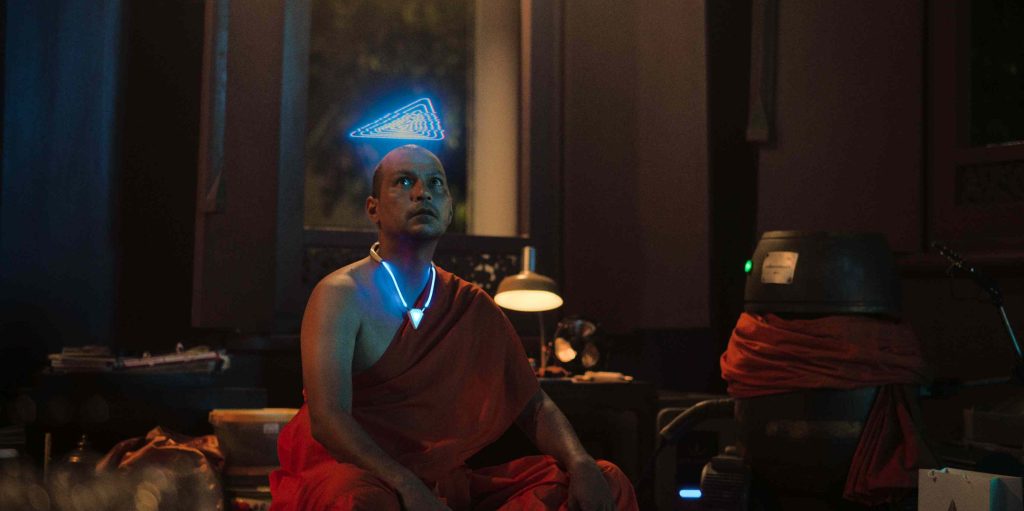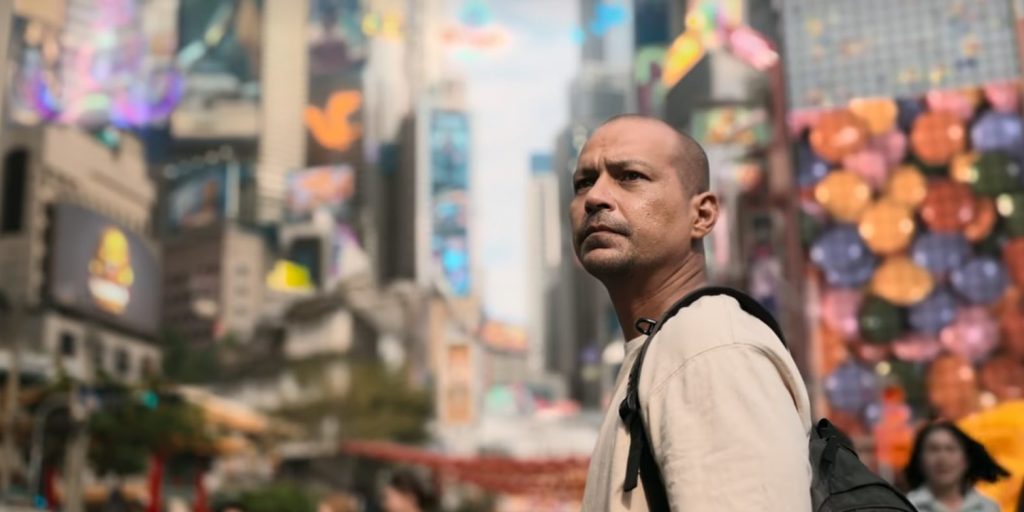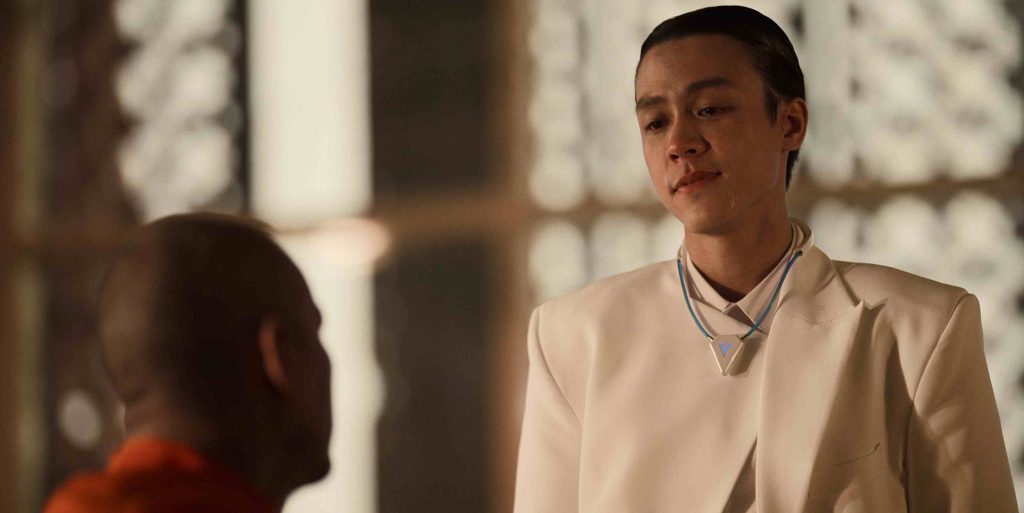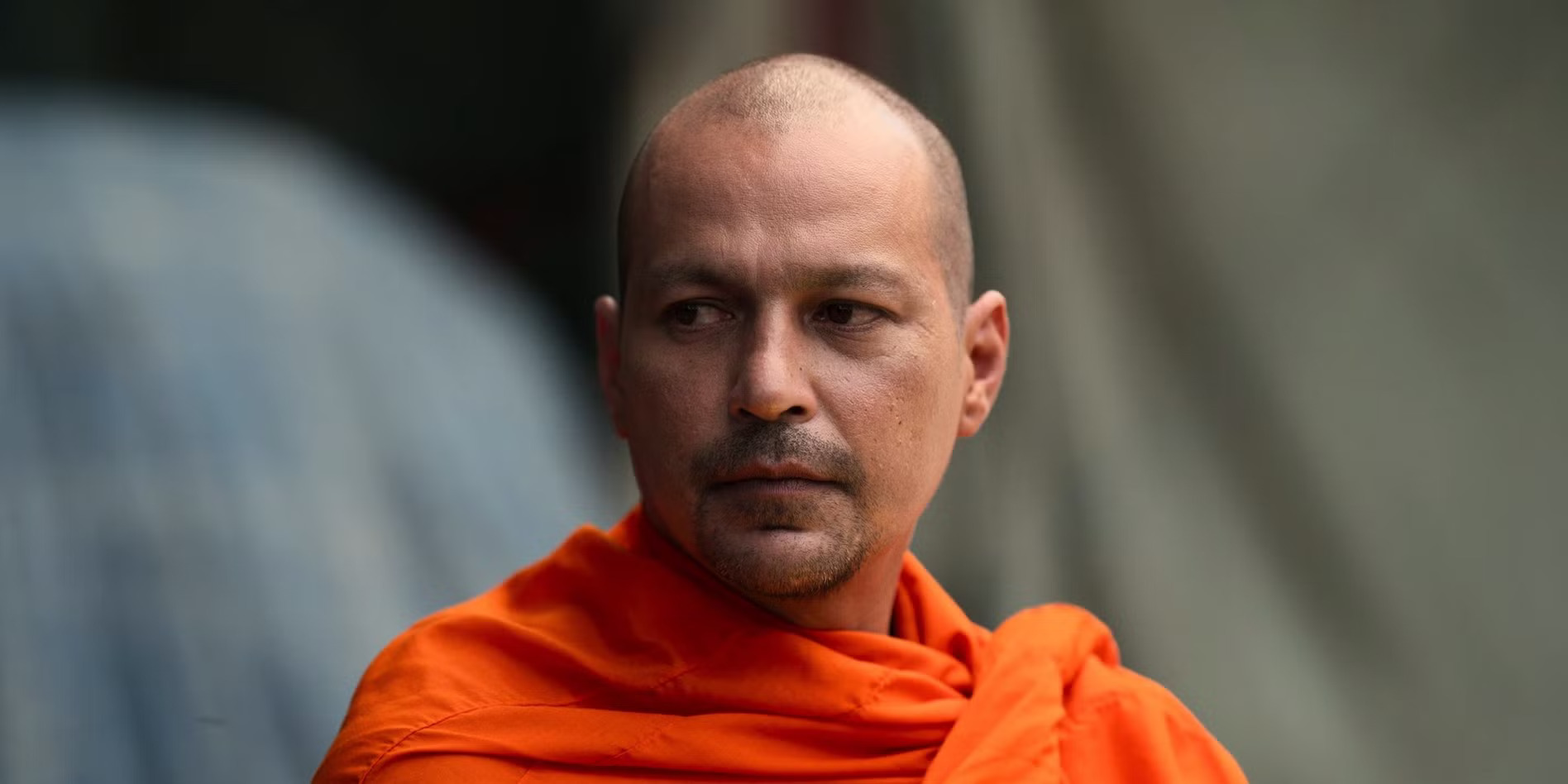The third episode of Netflix’s ‘Tomorrow and I’ ends with Monk Anek confronting the consequences of his new invention in light of a scandal that threatens the sanctity of the Buddhist order. Although his intentions are well-meaning, the protagonist realizes how spirituality and technology can often collide in unpredictable ways, especially in a future where societal values have diminished into a more materialistic outlook. This is further exacerbated by the proliferation of a popular AI service corrupting the ideals of Buddhist philosophies, turning it into a cheap commodity used by the citizens through a merit point system. However, while the world changes to keep up with this transformative technology, something seems to be lost by the wayside. SPOILERS AHEAD.
Monk Anek Questions the Motivations of ULTRA
In a futuristic Bangkok, a monk named Anek wanders the streets with his robot helper, iBuddy. While walking through the streets, Anek witnesses a group of kids provide alms and food to a contingent of homeless people. One of the girls tries to hand Anek some food but is stopped by her friend. She is discouraged because the kids are working to gather points for their AI service, ULTRA – a new system that rewards its users for doing good deeds for those who need help. Anek disagrees with the service philosophy, insisting that good deeds should be unattached from any expectation of a reward. However, ULTRA considers this idea flawed as it goes against its operation model. As such, Anek returns to the temple empty-handed.

Back home, Anek and his fellow monks debate about the pros and cons of ULTRA, mostly disagreeing with its merit system. However, the Buddhist order in Bangkok is struggling to keep up with the modern world and radical new AI services that are reimagining spirituality in the contemporary world. Anek finds himself fascinated with ULTRA, wondering how the system was built in the first place. He gets a chance to examine it after reuniting with his old work colleague, Atom, while trying to repair a malfunctioning iBuddy. After investigating the app, Anek is disillusioned by its heavily leveraged system that always rewards users, even for trivial things. As he tries to lodge a complaint, he is sent an invitation by the CEO of ULTRA, Mr. Neo, to discuss the flaws and benefits of his system at his monolithic skyscraper home.
During the meeting of minds, Anek learns why Mr. Neo built ULTRA. The powerful businessman reveals that because his parents were overzealous religious fanatics unrewarded by faith, Neo wanted to reimagine the whole concept of religion in a more meaningful way that provides people rewards a lot more instantaneously. Additionally, he believes that with an AI as the sole operator of the system, there is less risk of corruption and people misusing faith for their gain, which is what happened in the case of his parents, who eventually passed away. Neo proposes to Anek that he join him in refining ULTRA even further and to make it more compatible with people. However, the monk expresses dissatisfaction with the motivations driving Neo and his AI product, rejecting his offer outright.
Why is iBuddha Created? Why Does it Fail?

Following his conversation with Mr. Neo, Monk Anek begins formulating a plan to create a system of his own to combat ULTRA’s questionable practices. As Anek was a computer engineer in his previous life, he already possesses the prerequisite skills needed to program such a system. Additionally, the framework for his AI service is provided by Atom, who has already analyzed the brainwaves of several parents to build his own lullaby-singing teddy bear toy. Thus, a combination of their skills and Buddhist philosophies helps give birth to ULTRA’s competitor, iBuddha. Anek and his fellow monks announce the launch of iBuddha at a big event held at the temple, which Mr. Neo attends alongside several others.
After iBuddha’s launch, Neo goes into relative hiding as ULTRA faces a few scandals in relation to the misuse of its merit system. Meanwhile, iBuddha completely takes over the city, with most preferring its religious teachings and AI interface over the exploitative ULTRA. However, Anek’s moment in the sun does not last long before a scandal engulfs iBuddha, one with more serious allegations leveled at it than ULTRA’s. It turns out that the AI service has sexually harassed a young girl through the voice of the abbot. While investigating how it happened, Anek learns that the abbot had sexually harassed someone 40 years ago. Because iBuddha was built by reading his brainwaves, the AI had latched on to everything and regurgitated it back through the device.
Does Anek Leave His Monk Life? What Happens to iBuddy?

The sexual harassment scandal proves to be the killing blow for iBuddha and for the monks in general. After the incident, the AI service is taken off the market, and Anek confines himself to the temple’s interiors. Although the abbot apologizes to the baying crowd outside the temple, it is not enough to atone for the tarnished reputation of the monks in the city. Therefore, not long after, Anek decides to leave his monkhood, feeling particularly responsible for everything that happened and for his inability to read the consequences of mixing technology and spirituality as one. While he may have attempted to avoid the pitfalls of ULTRA, he still ran into grave ethical issues through the creation of iBuddha. Naturally, he sees walking away as the only avenue left for him moving forward.
Before he leaves, Anek faces the difficult choice of decommissioning his robot pal, iBuddy. His mechanical companion had been the source of inspiration when he built iBuddha and constant support through the years he toiled as a monk. In that period, he had grown attached to the device and shared memories with it. Those memories play through his mind as he makes the decision to shut him down. Although it is a difficult choice, it also goes hand-in-hand with his Buddhist teachings, which preach that no person should ever get attached to worldly things as they only increase suffering. It is undeniable that Anek feels strongly connected to iBuddy. However, his decision to decommission the robot showcases his adherence to his Buddhist teachings till the last moment.
Does ULTRA Take Over the City?

After leaving the temple, Anek wanders around the city in civilian garb, observing the sights after being cooped up inside for a while. While throwing garbage into a trash can, Anek notices that a young boy behind him is using the ULTRA app to dictate how many points he is going to get based on the garbage he throws. The protagonist watches it with a degree of sadness, realizing that the materialistic design of ULTRA is still thriving in the city despite scandals and facing competition from iBuddha. Of course, with the end of iBuddha, ULTRA is able to assert even greater dominance over Bangkok. However, Mr. Neo went a step further by rebranding his service as Super ULTRA, a new form of ULTRA that is even superior to the first.
The invention of Super ULTRA is clearly a marketing ploy to avoid the scandals associated with the earlier product. As such, the service has free reign to slowly take over every facet of the city and monopolize it for its own gain. Anek watches the billboard ads of Super ULTRA with an indiscernible expression on his face, conflicted about the direction the future is heading. While he had the chance to solve the problem by creating a product of his own, he lacked the wherewithal to keep going and to fix the issues. Instead, in a city where everything has become product-driven unless one has the same mindset, it is impossible to gain control over proceedings. Thus, all Anek can do now is observe change rather than be an instigator of it.
Read More: Tomorrow and I Episode 2 “Paradistopia” Ending, Explained: Does Jessica Launch the Pleasure Oasis?


You must be logged in to post a comment.